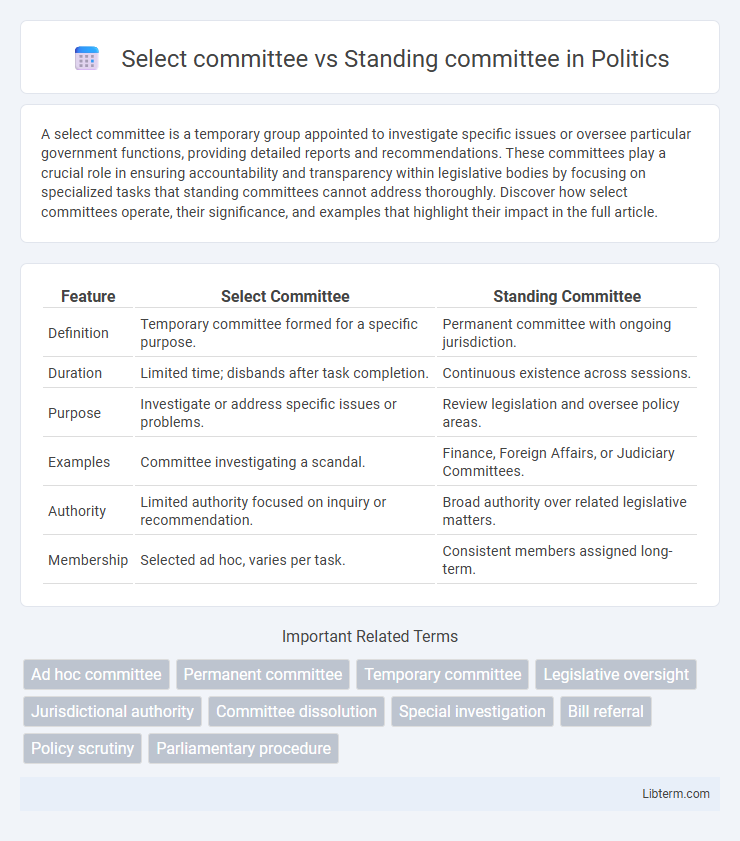A select committee is a temporary group appointed to investigate specific issues or oversee particular government functions, providing detailed reports and recommendations. These committees play a crucial role in ensuring accountability and transparency within legislative bodies by focusing on specialized tasks that standing committees cannot address thoroughly. Discover how select committees operate, their significance, and examples that highlight their impact in the full article.
Table of Comparison
| Feature | Select Committee | Standing Committee |
|---|---|---|
| Definition | Temporary committee formed for a specific purpose. | Permanent committee with ongoing jurisdiction. |
| Duration | Limited time; disbands after task completion. | Continuous existence across sessions. |
| Purpose | Investigate or address specific issues or problems. | Review legislation and oversee policy areas. |
| Examples | Committee investigating a scandal. | Finance, Foreign Affairs, or Judiciary Committees. |
| Authority | Limited authority focused on inquiry or recommendation. | Broad authority over related legislative matters. |
| Membership | Selected ad hoc, varies per task. | Consistent members assigned long-term. |
Introduction to Congressional Committees
Select committees are temporary panels established by Congress to address specific issues not covered by existing committees, often dissolving after completing their task. Standing committees are permanent legislative bodies with defined jurisdictions, responsible for ongoing oversight, legislation, and hearings within their specialized policy areas. Both committee types play crucial roles in shaping legislation and holding the executive branch accountable within the U.S. congressional system.
Definition of Select Committees
Select committees are temporary panels established to investigate specific issues or address particular tasks that fall outside the scope of standing committees, dissolving once their objectives are met. These committees focus on detailed examination and fact-finding, often providing recommendations for legislative or administrative action. Unlike standing committees, select committees do not have ongoing jurisdiction and are formed to tackle unique or emergent concerns assigned by the legislative body.
Definition of Standing Committees
Standing committees are permanent legislative panels established under the rules of a legislative body, tasked with considering bills and issues related to specific subject areas such as finance, agriculture, or defense. They hold continuous authority throughout legislative sessions, enabling oversight, investigation, and detailed examination of policies and government operations. Unlike Select committees, which are temporary and created for special tasks, Standing committees play a critical role in shaping legislation and maintaining institutional expertise.
Composition and Membership Differences
Select committees consist of members appointed for a specific purpose or investigation, typically including fewer legislators with specialized expertise relevant to the issue. Standing committees have a fixed membership and permanent status, composed of members representing various party proportions to handle ongoing legislative areas. The composition of select committees is temporary and issue-focused, while standing committees maintain broad, stable membership to oversee continuous legislative functions.
Powers and Jurisdictions
Select committees possess limited powers and specific, temporary jurisdictions focused on particular issues or investigations, often lacking legislative authority to draft bills. Standing committees hold broad, continuous jurisdictions over specific policy areas, with established powers to review legislation, conduct hearings, and oversee government agencies. The permanent nature of standing committees grants them ongoing influence in shaping laws and public policy within their defined domains.
Formation and Duration
Select committees are formed for a specific purpose or investigation and exist only for a limited time until their task is completed, making their duration temporary and task-oriented. Standing committees are permanent bodies established by the legislative rules, continuously functioning to handle ongoing legislative responsibilities and issues within specific policy areas. The formation of select committees is ad hoc and approved as needed, while standing committees are constituted at the start of each legislative session or term.
Functions and Responsibilities
Select committees handle specific issues or investigations, providing detailed oversight and recommendations on targeted subjects outside routine legislative activities. Standing committees maintain continuous jurisdiction over broad policy areas such as finance, defense, or education, reviewing legislation, monitoring government operations, and conducting hearings regularly. Both committees play crucial roles in shaping legislation and ensuring government accountability, yet standing committees have ongoing responsibilities while select committees are temporary and issue-specific.
Historical Examples of Each Committee Type
The Senate Watergate Committee, a prominent select committee from the 1970s, exemplifies focused investigation into political scandal, while the House Ways and Means Committee serves as a historic example of a standing committee managing tax legislation since the early 19th century. Standing committees, such as the Senate Judiciary Committee established in 1816, maintain ongoing jurisdiction over broad policy areas, enabling continuous legislative oversight and development. In contrast, select committees like the Senate Select Committee on Intelligence, created during the 1970s, operate temporarily to address specific issues or crises before disbanding.
Advantages and Limitations
Select committees offer flexibility by addressing specific issues with focused expertise and limited duration, which allows for in-depth investigations and tailored recommendations. However, they lack permanence, leading to potential discontinuity and limited influence over broader legislative processes. Standing committees provide consistent oversight and expertise on ongoing legislative areas, promoting stability and institutional memory, but their broader mandates may dilute focus and slow responsiveness to emergent issues.
Conclusion: Selecting the Right Committee
Choosing between a Select committee and a Standing committee depends on the task's nature and duration, as Select committees are temporary and focus on specific issues, while Standing committees are permanent with ongoing legislative responsibilities. Evaluating the committee's purpose ensures effective oversight, timely decision-making, and specialized expertise alignment. Proper committee selection optimizes legislative efficiency and accountability in governance.
Select committee Infographic

 libterm.com
libterm.com